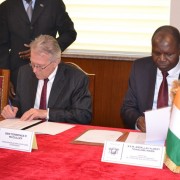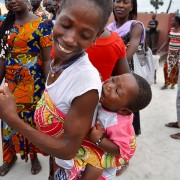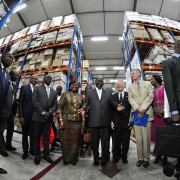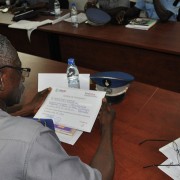
On Friday, June 17, 2016 the Ambassador of the United States, Terence P. McCulley and the Minister of Foreign Affairs, Dr. Abdallah Albert Toikeusse Mabri, signed a modification to two Limited Scope Grant Agreements which increased the U.S Government’s commitment to support Côte d'Ivoire to achieve its development goals.

The goal of USAID/REVE is to eliminate the vulnerabilities associated with HIV for Persons Living with HIV (PLHIV), Orphans and Vulnerable Children (OVC) and adolescent girls in Côte d’Ivoire by building the capacity among the beneficiaries, the governmental and community institutions to provide appropriate care, and economic and social support for OVC.

When HIV treatment lapses, opportunistic infections and illnesses can arise, posing a real threat to patients' health. Tuberculosis (TB) is one such infection and the fifth most common cause of death in Côte d'Ivoire. While all health facilities treating HIV and AIDS patients in Côte d'Ivoire should also regularly screen for TB, this is often not the case due to a lack of resources.
The crisis that erupted after the contested 2010 presidential election results in Côte d'Ivoire left the country deeply divided, with over 3,000 people dead and great doubt about a the prospect of future peaceful elections and transitions of power. After the 2010 crisis, anxiety about the 2015 election lingered and affected the thinking of many about what it would mean for Côte d'Ivoire. Would it reignite the recent conflict? Would the election be fair and transparent with credible results – both in perception and in actuality? These are the reasons why the United States Agency for International Development (USAID) partnered with the Consortium for Elections and Political Process Strengthening (CEPPS) and 14 civil society organizations to form an independent platform to provide outside verification of the credibility of the election outcome.

With the support of USAID, the Ivoirian Government is making significant strides rebuilding the rule of law and restoring public confidence in the justice sector after years of unrest and stagnation. In particular, the USAID-funded Justice Sector Support Program (“ProJustice”) is carrying out intensive capacity building activities such as nationwide joint trainings of prosecutors, investigating judges, and judicial police officers (JPOs). The result has been improved communication, cooperation, and effectiveness of investigations, prosecutions, and court cases








Comment
Make a general inquiry or suggest an improvement.